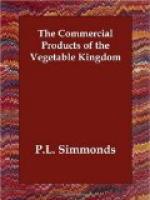[Footnote 6: In the West Indies, from my own experience, I have found this to be one of the worst descriptions of soil. P.L.S.]
[Footnote 7: Correspondent of the Singapore Free Press, December, 1852.]
[Footnote 8: It is important, in considering what tea may be had from China, to consider the manner of its production. It is grown over an immense district, in small farms, or rather gardens, no farm producing more that 600 chests. “The tea merchant goes himself, or sends his agents to all the small towns, villages, and temples in the district, to purchase tea from the priests and small farmers; the large merchant, into whose hands the tea thus comes, has to refire it and pack it for the foreign market.”—(Fortune’s Tea Districts.) This refiring is the only additional process of manufacture for our market. Mr. Fortune elsewhere, in his valuable work, giving an account of the cost of tea from the farmers, the conveyance to market, and the merchant’s profit, states that " the small farmer and manipulator is not overpaid, but that the great profits are received by the middlemen.” No doubt these men do their utmost to keep the farmers in complete ignorance of the state of the tea-market, that they may monopolise the advantages, but it is pretty certain that the news of a bold reduction of duty, and the promise of an immensely increased consumption, would reach even the Chinese farmers, and make them pick their trees more closely—a little of which amongst so many would make a vast difference in the total supply.]
[Footnote 9: See article Thea, by Dr. Royle, in “Penny Cyclopaedia,” vol xxiv., p. 286.]




